-
Product Name
PCNA antibody
- Documents
-
Description
PCNA Rabbit Polyclonal antibody. Positive IHC detected in human breast cancer tissue, human stomach cancer tissue. Positive IF detected in HepG2 cells. Positive FC detected in HEK-293T cells. Positive WB detected in MCF7 cells, A431 cells, HEK-293 cells, HeLa cells, HepG2 cells, Jurkat cells, mouse liver tissue, mouse testis tissue, NIH/3T3 cells, Raji cells, rat liver tissue, rat testis tissue. Positive IP detected in MCF-7 cells. Observed molecular weight by Western-blot: 36-38 kDa
-
Tested applications
ELISA, IF, IP, WB, IHC, FC
-
Species reactivity
Human,Mouse,Rat,Zebrafish; other species not tested.
-
Alternative names
Cyclin antibody; PCNA antibody
-
Isotype
Rabbit IgG
-
Preparation
This antibody was obtained by immunization of PCNA recombinant protein (Accession Number: NM_002592). Purification method: Antigen affinity purified.
-
Clonality
Polyclonal
-
Formulation
PBS with 0.1% sodium azide and 50% glycerol pH 7.3.
-
Storage instructions
Store at -20℃. DO NOT ALIQUOT
-
Applications
Recommended Dilution:
WB: 1:1000-1:10000
IP: 1:500-1:5000
IHC: 1:20-1:200
IF: 1:20-1:200
-
Validations
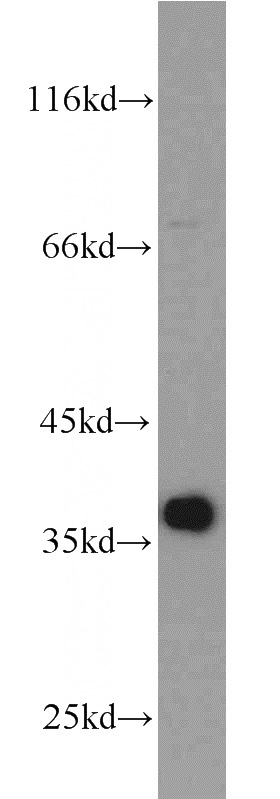
MCF7 cells were subjected to SDS PAGE followed by western blot with Catalog No:117336(PCNA antibody) at dilution of 1:2000
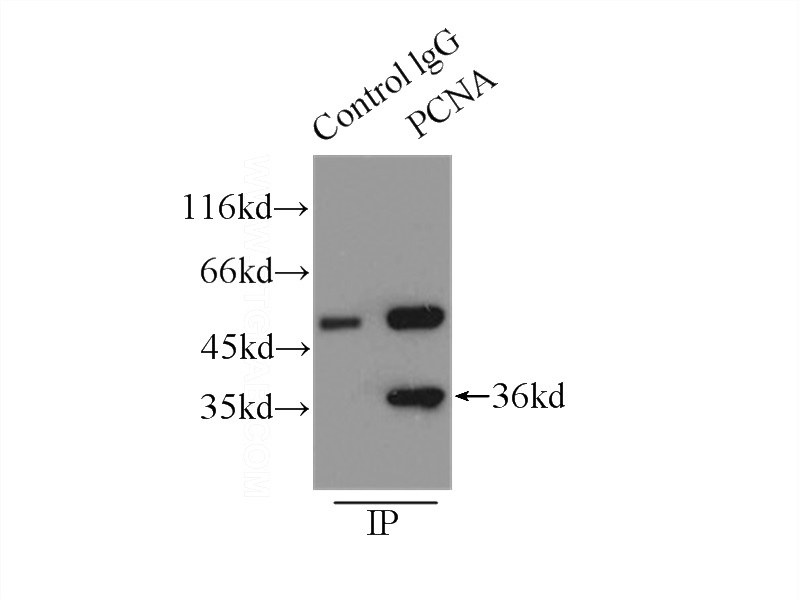
IP Result of anti-PCNA (IP:Catalog No:117336, 3ug; Detection:Catalog No:117336 1:1500) with MCF-7 cells lysate 2500ug.
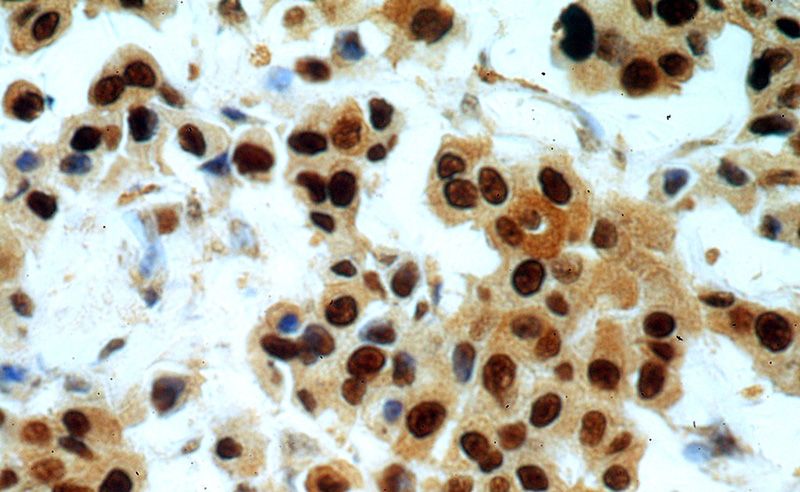
Immunohistochemical of paraffin-embedded human breast cancer using Catalog No:117336(PCNA antibody) at dilution of 1:50 (under 40x lens)
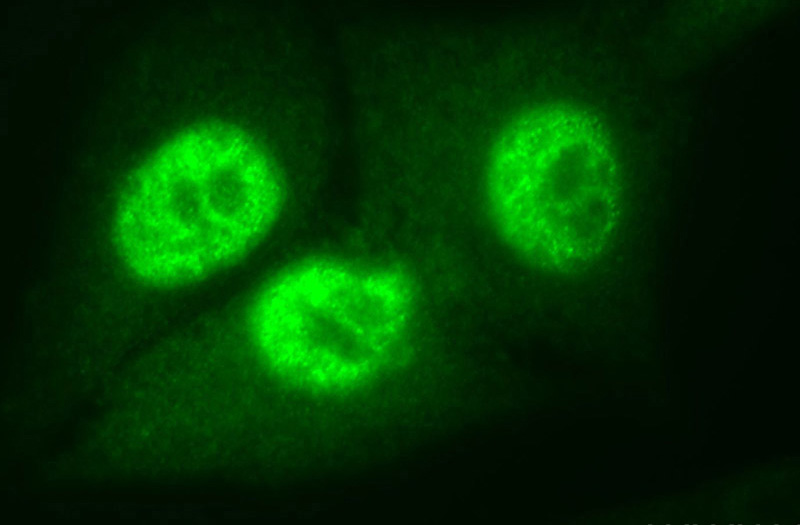
Immunofluorescent analysis of HepG2 cells, using PCNA antibody Catalog No:117336 at 1:50 dilution and FITC-labeled donkey anti-rabbit IgG (green).
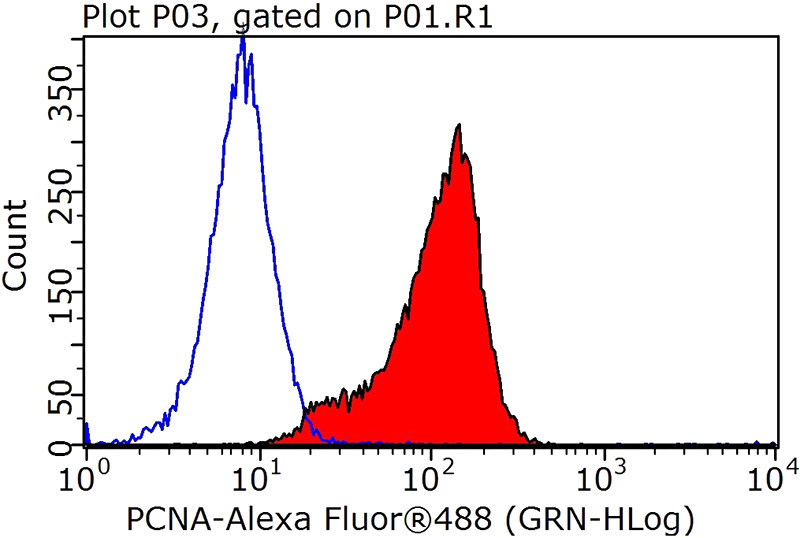
1X10^6 HEK-293T cells were stained with .2ug PCNA antibody (Catalog No:117336, red) and control antibody (blue). Fixed with 90% MeOH blocked with 3% BSA (30 min). Alexa Fluor 488-congugated AffiniPure Goat Anti-Rabbit IgG(H+L) with dilution 1:1000.
-
Background
Proliferating Cell Nuclear Antigen, commonly known as PCNA, is a protein that acts as a processivity factor for DNA polymerase δ in eukaryotic cells. This protein is an auxiliary protein of DNA polymerase delta and is involved in the control of eukaryotic DNA replication by increasing the polymerase's processibility during elongation of the leading strand. PCNA induces a robust stimulatory effect on the 3'-5' exonuclease and 3'-phosphodiesterase, but not apurinic-apyrimidinic (AP) endonuclease, APEX2 activities. It has to be loaded onto DNA in order to be able to stimulate APEX2. PCNA protein is highly conserved during evolution; the deduced amino acid sequences of rat and human differ by only 4 of 261 amino acids. PCNA has been used as loading control for proliferating cells. This antibody is a rabbit polyclonal antibody raised against an internal region of human PCNA.
-
References
- Kang K, Peng X, Zhang X. MicroRNA-124 suppresses the transactivation of nuclear factor of activated T cells by targeting multiple genes and inhibits the proliferation of pulmonary artery smooth muscle cells. The Journal of biological chemistry. 288(35):25414-27. 2013.
- Gou D, Ramchandran R, Peng X. miR-210 has an antiapoptotic effect in pulmonary artery smooth muscle cells during hypoxia. American journal of physiology. Lung cellular and molecular physiology. 303(8):L682-91. 2012.
- Sarkar J, Gou D, Turaka P, Viktorova E, Ramchandran R, Raj JU. MicroRNA-21 plays a role in hypoxia-mediated pulmonary artery smooth muscle cell proliferation and migration. American journal of physiology. Lung cellular and molecular physiology. 299(6):L861-71. 2010.
- Wang Z, Liu F, Tu W. Embryonic liver fodrin involved in hepatic stellate cell activation and formation of regenerative nodule in liver cirrhosis. Journal of cellular and molecular medicine. 16(1):118-28. 2012.
- Lu WG, Chen H, Wang D, Li FG, Zhang SM. Regionspecific survival and differentiation of mouse embryonic stem cell-derived implants in the adult rat brain. Sheng li xue bao :
- Song Y, Xue L, Du S. Caveolin-1 knockdown is associated with the metastasis and proliferation of human lung cancer cell line NCI-H460. Biomedicine & pharmacotherapy = Biomédecine & pharmacothérapie. 66(6):439-47. 2012.
- Lu Z, Tian Y, Salwen HR. Histone-lysine methyltransferase EHMT2 is involved in proliferation, apoptosis, cell invasion, and DNA methylation of human neuroblastoma cells. Anti-cancer drugs. 24(5):484-93. 2013.
- Ning Y, Huang H, Dong Y. 5-Aza-2'-deoxycytidine inhibited PDGF-induced rat airway smooth muscle cell phenotypic switching. Archives of toxicology. 87(5):871-81. 2013.
Related Products / Services
Please note: All products are "FOR RESEARCH USE ONLY AND ARE NOT INTENDED FOR DIAGNOSTIC OR THERAPEUTIC USE"
